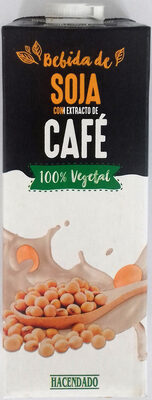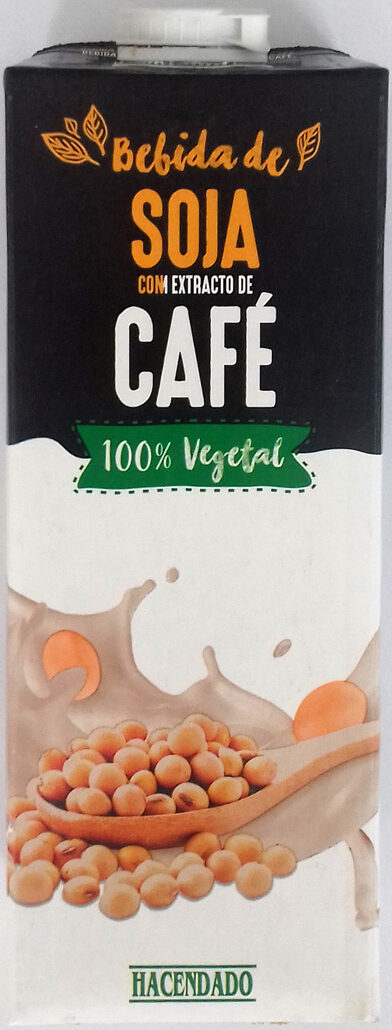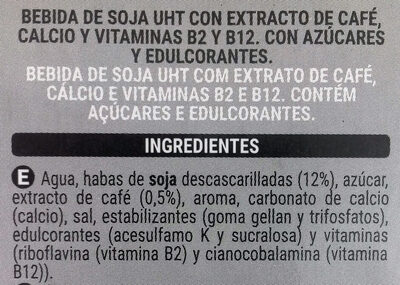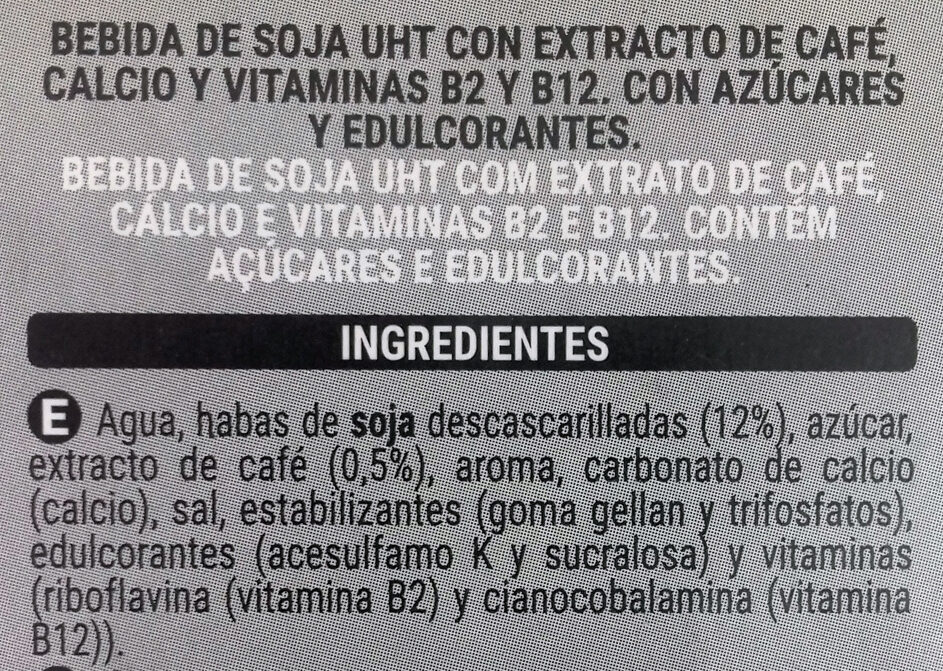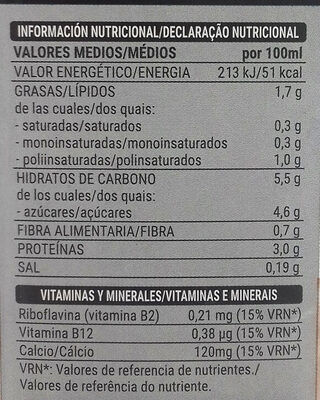Help us make food transparency the norm!
As a non-profit organization, we depend on your donations to continue informing consumers around the world about what they eat.
The food revolution starts with you!
Bebida de soja con extracto de café - Hacendado - 1 l
Bebida de soja con extracto de café - Hacendado - 1 l
This product page is not complete. You can help to complete it by editing it and adding more data from the photos we have, or by taking more photos using the app for Android or iPhone/iPad. Thank you!
×
Barcode: 8480000293039 (EAN / EAN-13)
Common name: Bebida de soja UHT con extracto de café, calcio y vitaminas B2 y B12. Con azúcares y edulcorantes
Quantity: 1 l
Packaging: Tetra Brik, es:UHT
Brands: Hacendado
Categories: Plant-based foods and beverages, Beverages, Plant-based foods, Legumes and their products, Dairy substitutes, Milk substitutes, Plant-based beverages, Plant-based milk alternatives, Artificially sweetened beverages, Legume-based drinks, Coffee drinks, Soy-based drinks, Coffee soy-based drinks, Sweetened beverages
Labels, certifications, awards:
No gluten, Vegetarian, No GMOs, Vegan, 100% vegetable, FSC, FSC Mix, Green Dot

Manufacturing or processing places: País Vasco, España
Traceability code: IPARLAT S.A.
Stores: Mercadona
Countries where sold: Spain
Matching with your preferences
Health
Ingredients
-
19 ingredients
water, peeled soybeans (12%), sugar, coffee extract (0.5%), aroma, calcium carbonate (calcium), salt, stabilizers (gellan gum and triphosphates), sweeteners (acesulfame k and sucralose) and vitamins (riboflavin (vitamin b2) and cyanocobalamin (vitamin b12))Allergens: Soybeans
Food processing
-
Ultra processed foods
Elements that indicate the product is in the 4 - Ultra processed food and drink products group:
- Additive: E418 - Gellan gum
- Additive: E451 - Triphosphates
- Additive: E950 - Acesulfame k
- Additive: E955 - Sucralose
- Ingredient: Flavouring
- Ingredient: Sweetener
Food products are classified into 4 groups according to their degree of processing:
- Unprocessed or minimally processed foods
- Processed culinary ingredients
- Processed foods
- Ultra processed foods
The determination of the group is based on the category of the product and on the ingredients it contains.
Additives
-
E418 - Gellan gum
Gellan gum: Gellan gum is a water-soluble anionic polysaccharide produced by the bacterium Sphingomonas elodea -formerly Pseudomonas elodea based on the taxonomic classification at the time of its discovery-. Its taxonomic classification has been subsequently changed to Sphingomonas elodea based on current classification system. The gellan-producing bacterium was discovered and isolated by the former Kelco Division of Merck & Company, Inc. in 1978 from the lily plant tissue from a natural pond in Pennsylvania, USA. It was initially identified as a substitute gelling agent at significantly lower use level to replace agar in solid culture media for the growth of various microorganisms Its initial commercial product with the trademark as "GELRITE" gellan gum, was subsequently identified as a suitable agar substitute as gelling agent in various clinical bacteriological media.Source: Wikipedia
-
E451 - Triphosphates
Sodium triphosphate: Sodium triphosphate -STP-, also sodium tripolyphosphate -STPP-, or tripolyphosphate -TPP-,- is an inorganic compound with formula Na5P3O10. It is the sodium salt of the polyphosphate penta-anion, which is the conjugate base of triphosphoric acid. It is produced on a large scale as a component of many domestic and industrial products, especially detergents. Environmental problems associated with eutrophication are attributed to its widespread use.Source: Wikipedia
-
E950 - Acesulfame k
Acesulfame potassium: Acesulfame potassium - AY-see-SUL-faym-, also known as acesulfame K -K is the symbol for potassium- or Ace K, is a calorie-free sugar substitute -artificial sweetener- often marketed under the trade names Sunett and Sweet One. In the European Union, it is known under the E number -additive code- E950. It was discovered accidentally in 1967 by German chemist Karl Clauss at Hoechst AG -now Nutrinova-. In chemical structure, acesulfame potassium is the potassium salt of 6-methyl-1‚2,3-oxathiazine-4-3H--one 2‚2-dioxide. It is a white crystalline powder with molecular formula C4H4KNO4S and a molecular weight of 201.24 g/mol.Source: Wikipedia
-
E955 - Sucralose
Sucralose: Sucralose is an artificial sweetener and sugar substitute. The majority of ingested sucralose is not broken down by the body, so it is noncaloric. In the European Union, it is also known under the E number E955. It is produced by chlorination of sucrose. Sucralose is about 320 to 1‚000 times sweeter than sucrose, three times as sweet as both aspartame and acesulfame potassium, and twice as sweet as sodium saccharin. Evidence of benefit is lacking for long-term weight loss with some data supporting weight gain and heart disease risks.It is stable under heat and over a broad range of pH conditions. Therefore, it can be used in baking or in products that require a long shelf life. The commercial success of sucralose-based products stems from its favorable comparison to other low-calorie sweeteners in terms of taste, stability, and safety. Common brand names of sucralose-based sweeteners are Splenda, Zerocal, Sukrana, SucraPlus, Candys, Cukren, and Nevella. Canderel Yellow also contains sucralose, but the original Canderel and Green Canderel do not.Source: Wikipedia
Ingredients analysis
-
Palm oil free
No ingredients containing palm oil detected
-
Vegan
No non-vegan ingredients
Unrecognized ingredients: Calcium, Cyanocobalamin, Vitamin b12
-
Vegetarian
No non-vegetarian ingredients detected
Unrecognized ingredients: Calcium, Cyanocobalamin, Vitamin b12
-
Details of the analysis of the ingredients
: Agua, habas de _soja_ 12%, azúcar, café 0.5%, aroma, carbonato de calcio (calcio), sal, estabilizantes (goma gellan, trifosfatos), edulcorantes (acesulfamo K, sucralosa), vitaminas (riboflavina (vitamina B2), cianocobalamina (vitamina B12))- Agua -> en:water - vegan: yes - vegetarian: yes - ciqual_food_code: 18066 - percent_min: 81.14 - percent_max: 87
- habas de _soja_ -> en:soya-bean - vegan: yes - vegetarian: yes - ciqual_food_code: 20901 - percent_min: 12 - percent: 12 - percent_max: 12
- azúcar -> en:sugar - vegan: yes - vegetarian: yes - ciqual_proxy_food_code: 31016 - percent_min: 0.5 - percent_max: 4.6
- café -> en:coffee - vegan: yes - vegetarian: yes - ciqual_proxy_food_code: 18003 - percent_min: 0.5 - percent: 0.5 - percent_max: 0.5
- aroma -> en:flavouring - vegan: maybe - vegetarian: maybe - percent_min: 0 - percent_max: 0.5
- carbonato de calcio -> en:e170i - vegan: maybe - vegetarian: maybe - percent_min: 0 - percent_max: 0.5
- calcio -> en:calcium - percent_min: 0 - percent_max: 0.5
- sal -> en:salt - vegan: yes - vegetarian: yes - ciqual_food_code: 11058 - percent_min: 0 - percent_max: 0.19
- estabilizantes -> en:stabiliser - percent_min: 0 - percent_max: 0.19
- goma gellan -> en:e418 - vegan: yes - vegetarian: yes - percent_min: 0 - percent_max: 0.19
- trifosfatos -> en:e451 - vegan: yes - vegetarian: yes - percent_min: 0 - percent_max: 0.19
- edulcorantes -> en:sweetener - percent_min: 0 - percent_max: 0.19
- acesulfamo K -> en:e950 - vegan: yes - vegetarian: yes - percent_min: 0 - percent_max: 0.19
- sucralosa -> en:e955 - vegan: yes - vegetarian: yes - percent_min: 0 - percent_max: 0.19
- vitaminas -> en:vitamins - vegan: yes - vegetarian: yes - percent_min: 0 - percent_max: 0.19
- riboflavina -> en:e101 - vegan: maybe - vegetarian: yes - percent_min: 0 - percent_max: 0.19
- vitamina B2 -> en:e101 - vegan: maybe - vegetarian: yes - percent_min: 0 - percent_max: 0.19
- cianocobalamina -> en:cyanocobalamin - percent_min: 0 - percent_max: 0.19
- vitamina B12 -> en:vitamin-b12 - percent_min: 0 - percent_max: 0.19
- riboflavina -> en:e101 - vegan: maybe - vegetarian: yes - percent_min: 0 - percent_max: 0.19
Nutrition
-
Bad nutritional quality
⚠ ️Warning: the amount of fruits, vegetables and nuts is not specified on the label, it was estimated from the list of ingredients: 12This product is considered a beverage for the calculation of the Nutri-Score.
Positive points: 0
- Proteins: 1 / 5 (value: 3, rounded value: 3)
- Fiber: 0 / 5 (value: 0.7, rounded value: 0.7)
- Fruits, vegetables, nuts, and colza/walnut/olive oils: 0 / 10 (value: 12, rounded value: 12)
Negative points: 12
- Energy: 8 / 10 (value: 213, rounded value: 213)
- Sugars: 4 / 10 (value: 4.6, rounded value: 4.6)
- Saturated fat: 0 / 10 (value: 0.3, rounded value: 0.3)
- Sodium: 0 / 10 (value: 76, rounded value: 76)
The points for proteins are not counted because the negative points are greater or equal to 11.
Nutritional score: (12 - 0)
Nutri-Score:
-
Nutrient levels
-
Fat in moderate quantity (1.7%)
What you need to know- A high consumption of fat, especially saturated fats, can raise cholesterol, which increases the risk of heart diseases.
Recommendation: Limit the consumption of fat and saturated fat- Choose products with lower fat and saturated fat content.
-
Saturated fat in low quantity (0.3%)
What you need to know- A high consumption of fat, especially saturated fats, can raise cholesterol, which increases the risk of heart diseases.
Recommendation: Limit the consumption of fat and saturated fat- Choose products with lower fat and saturated fat content.
-
Sugars in moderate quantity (4.6%)
What you need to know- A high consumption of sugar can cause weight gain and tooth decay. It also augments the risk of type 2 diabetes and cardio-vascular diseases.
Recommendation: Limit the consumption of sugar and sugary drinks- Sugary drinks (such as sodas, fruit beverages, and fruit juices and nectars) should be limited as much as possible (no more than 1 glass a day).
- Choose products with lower sugar content and reduce the consumption of products with added sugars.
-
Salt in moderate quantity (0.19%)
What you need to know- A high consumption of salt (or sodium) can cause raised blood pressure, which can increase the risk of heart disease and stroke.
- Many people who have high blood pressure do not know it, as there are often no symptoms.
- Most people consume too much salt (on average 9 to 12 grams per day), around twice the recommended maximum level of intake.
Recommendation: Limit the consumption of salt and salted food- Reduce the quantity of salt used when cooking, and don't salt again at the table.
- Limit the consumption of salty snacks and choose products with lower salt content.
-
-
Nutrition facts
Nutrition facts As sold
for 100 g / 100 mlCompared to: Coffee drinks Energy 213 kj
(51 kcal)-39% Fat 1.7 g -19% Saturated fat 0.3 g -78% Monounsaturated fat 0.3 g Polyunsaturated fat 1 g Carbohydrates 5.5 g -52% Sugars 4.6 g -48% Fiber 0.7 g +77% Proteins 3 g +18% Salt 0.19 g +16% Vitamin B2 (Riboflavin) 0.21 mg -59% Vitamin B12 (cobalamin) 0.38 µg -54% Calcium 120 mg +50% Fruits‚ vegetables‚ nuts and rapeseed‚ walnut and olive oils (estimate from ingredients list analysis) 12 %
Environment
-
Eco-Score A - Very low environmental impact
⚠ ️Select a country in order to include the full impact of transportation.The Eco-Score is an experimental score that summarizes the environmental impacts of food products.→ The Eco-Score was initially developped for France and it is being extended to other European countries. The Eco-Score formula is subject to change as it is regularly improved to make it more precise and better suited to each country.Life cycle analysis
-
Average impact of products of the same category: A (Score: 90/100)
Category: Soy drink, plain, prepacked
Category: Soy drink, plain, prepacked
- PEF environmental score: 0.04 (the lower the score, the lower the impact)
- including impact on climate change: 0.44 kg CO2 eq/kg of product
Stage Impact Agriculture
28.5 %Processing
14.6 %Packaging
22.9 %Transportation
24.2 %Distribution
9.8 %Consumption
0.0 %
Bonuses and maluses
-
Missing origins of ingredients information
Malus: -5
⚠ ️ The origins of the ingredients of this product are not indicated.
If they are indicated on the packaging, you can modify the product sheet and add them.
If you are the manufacturer of this product, you can send us the information with our free platform for producers.
-
Packaging with a low impact
Malus: -4
Shape Material Recycling Impact Brick Tetra Brik Medium
Eco-Score for this product
-
Impact for this product: A (Score: 81/100)
Product: Bebida de soja con extracto de café - Hacendado - 1 l
Life cycle analysis score: 90
Sum of bonuses and maluses: -9
Final score: 81/100
-
Carbon footprint
-
Equal to driving 0.2 km in a petrol car
44 g CO² per 100g of product
The carbon emission figure comes from ADEME's Agribalyse database, for the category: Soy drink, plain, prepacked (Source: ADEME Agribalyse Database)
Stage Impact Agriculture
24.7 %Processing
20.2 %Packaging
23.0 %Transportation
28.7 %Distribution
3.4 %Consumption
0.0 %
Packaging
-
Packaging with a low impact
-
Packaging parts
Brick (Tetra Brik)
-
Packaging materials
Material % Packaging weight Packaging weight per 100 g of product
-
Transportation
-
Origins of ingredients
Missing origins of ingredients information
⚠ ️ The origins of the ingredients of this product are not indicated.
If they are indicated on the packaging, you can modify the product sheet and add them.
If you are the manufacturer of this product, you can send us the information with our free platform for producers.Add the origins of ingredients for this product Add the origins of ingredients for this product
Report a problem
-
Incomplete or incorrect information?
Category, labels, ingredients, allergens, nutritional information, photos etc.
If the information does not match the information on the packaging, please complete or correct it. Open Food Facts is a collaborative database, and every contribution is useful for all.
